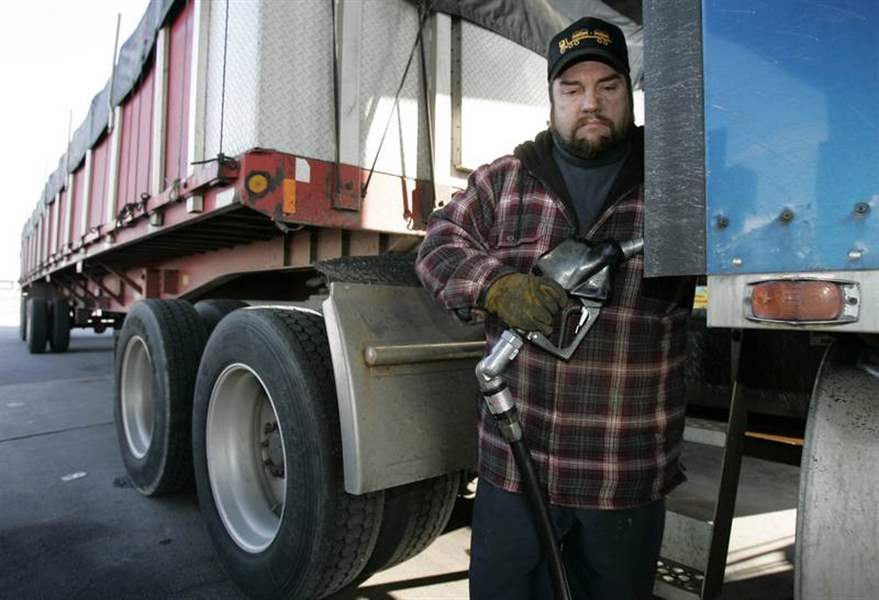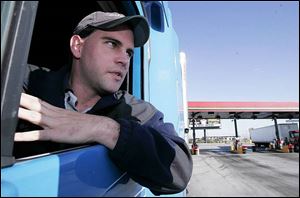
Trucking group pushes speed-control devices
12/10/2006
Howard Waite of Parish, N.Y., says independent drivers are less likely to drive recklessly because they own their own trucks.

Tractor-trailer driver Matt Frey passes through a truck stop in Stony Ridge during a recent delivery run.
Some truckers say that when their wheels aren't turning, they're not earning.
So why is the nation's largest trucking organization asking the federal government to require that new trucks be equipped with devices restricting top speed to 68 miles per hour?
Safety and fuel economy, says the American Trucking Associations, which has petitioned the Federal Motor Carrier Safety and National Highway Traffic Safety administrations to require the devices. Most commonly, these involve a microchip in a truck's engine computer that restricts how fast the engine can run.
Dave Osiecki, the trucking association's vice president, said the proposal is aimed at "a small minority of drivers and trucks that are operating at excessive speeds."
"We think it's terrific from a safety standpoint," said Russ Rader, a spokesman for the Insurance Institute for Highway Safety. "We applaud the trucking association for taking this step."
The proposal is opposed, however, by the Owner-Operators and Independent Drivers Association, which claims that drivers need the ability to accelerate above 68 mph in certain traffic and emergency situations.
The group, which said it has more than 145,000 members in the U.S. and Canada, claims the larger truck companies represented by the trucking associations are promoting speed-control devices as a ploy to avoid costly driver training and get government approval for bigger, heavier trucks.
"It's all just a public-relations effort to imply that bigger companies are safer companies," said Todd Spencer, president of the Owner-Operators and Independent Drivers Association.

Howard Waite of Parish, N.Y., says independent drivers are less likely to drive recklessly because they own their own trucks.
Mr. Spencer argued that larger firms hope to stanch an exodus of employees from their ranks to smaller competitors that allow their drivers "speeds that will go with the flow of traffic."
"Drivers sometimes need to be able to speed up to maneuver in emergencies," Mr. Spencer said. "If you don't have the ability to drive with the flow of traffic, you create another accident-causing situation."
Federal officials have yet to establish a timetable for considering the speed-controller proposal. If adopted, the rule would have the greatest impact on trucks operating in Western and Southern states that have speed limits of 70 or 75 mph for all traffic.
Spokesmen for the Ohio Highway Patrol and the Michigan State Police say the proposal would have a minimal impact on their activities; they would continue to enforce their respective 55 and 60 mph speed limits for trucks.
Capt. Roger Hannay, commander of the Ohio patrol's district office for the Ohio Turnpike, said speed-control devices would corral truckers who cheat the turnpike speed limit of 65 mph. The turnpike speed limit was raised in September, 2004, as part of a campaign to woo big rigs back to the toll road from parallel secondary routes.
"It'd be nice to know that they're limited, though I'm not sure I like 68 miles per hour," Captain Hannay said. "It's not too frequent that we get commercial vehicles going way over 65, because they know they've got a good thing up here. But we do get the occasional commercial motor vehicle that's being really aggressive, and this would keep them at 68."
In 2004, 5,190 people died in crashes involving large trucks. While that represented an all-time low rate of 2.29 deaths per 100 million truck-miles, it still was 154 more deaths than in 2003, and the truck-related death toll rose again last year to 5,212.
In fact, trucker fatalities that were declining each year through 2002 started to rise again in 2003, the year the federal government began deregulation of the trucking industry.
Mr. Rader said speed is a factor in about one-third of fatal truck crashes, and the vast majority of crash victims are drivers or passengers in smaller vehicles.
Federal records indicate the highest year for truck-related crashes occurred in 1979, when 6,702 people died on U.S. highways, and the death rate was 6.15 per million truck-miles.
Many national and regional truck lines already limit the speeds their drivers can drive.
Local trucking executive Ed Nagle said the 65 trucks his company, Nagle Line, operates all have governors set at 68 mph for economy and safety.
"From a fuel economy standpoint, anything over 55 mph is a waste," Mr. Nagle said. "Then there's contingent liability. If I give a guy a loaded weapon - a truck - and he goes 90 mph, it comes back to me."
"The faster you go with a truck, the less control you have," agreed Keith Tuttle, president of Motor Carrier Service in Northwood, which has 100 trucks. "Every single truck that we own" is limited to 64 mph, he said.
Not every local truck operator that limits drivers' speeds agrees there is a need for a new federal regulation.
"I don't need the government coming in and telling us how to run," said Dean Kaplan, chief executive officer of K-Limited, a Toledo-based hazardous-materials specialist with 72 trucks whose engines allow a maximum speed of 68 mph.
Along with its own payroll, Nagle Line has 10 owner-operators under contract. Mr. Nagle said he believes owner-operators' opposition to the speed-limiter proposal is driven more by a general libertarian sentiment among that industry sector than to a disregard for safety or economy.
"Most of the owner-operators just don't like to be told what to do," he said. "They just don't want to feel handcuffed."
Matt Frey, a trucker from Danville, Pa., said that while he considers trucks with speed control "a lot safer," he understands the other perspective too.
"If you pay $130,000 for a truck, you should be able to speed if you want to," he said.
Mr. Nagle said he thinks drivers for private truck fleets, such as those operated by major manufacturers or retailers, are more likely to speed "because they don't have to pay for the fuel."
"The owner-operator has more consideration for his fuel cost because it comes out of his own pocket," he said.
"Owner-operators, they take care of their equipment. They behave themselves," agreed Howard Waite, a steel hauler from Parish, N.Y., whose regular runs often bring him to the Toledo area.
Anne McCartt, the Insurance Institute's vice president for research, said there are plenty of owner-operators and small trucking companies "that follow the rules," but she added that the problems tend to be concentrated in that sector of the industry.
Many smaller carriers "do have economic pressures to get their loads someplace in a short amount of time," Ms. McCartt said. But she added: "Allowing trucks unlimited speed can't be justified."
Jim Emerine, a Toledo-based driver for FedEx Freight who has won several safety competitions, said independent truckers - small companies and owner-operators - are the ones most likely to pass his truck, which is limited to 65 mph, on the freeway.
"Owner-operators are their own boss," he said. "They're often working under lower wages, and they are pressed."
Mr. Tuttle of Motor Carrier Service pointed out that owner-operators are paid by the mile.
"The more miles they can get in a day, the more money they're going to make," he said. "But safety pays too."
Contact David Patch at: dpatch@theblade.com or 419-724-6094.